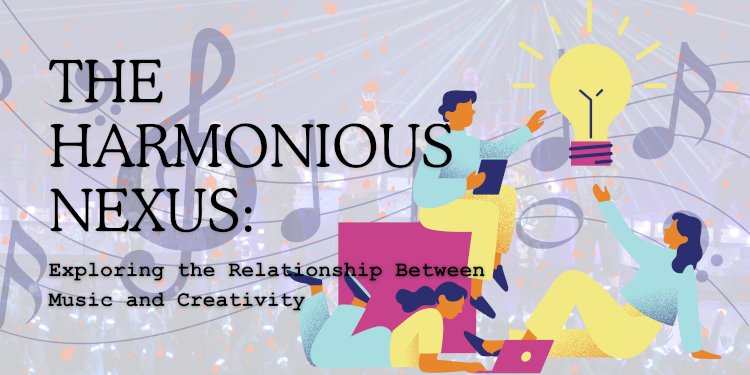The Harmonious Nexus: Exploring the Relationship Between Music and Creativity
Music and creativity share a symbiotic relationship, with music serving as both a muse and a medium for creative expression. Through its cognitive effects, emotional resonance, facilitation of flow states, and promotion of collaborative creativity, music enriches our lives and enhances our creative endeavours. From the cognitive benefits of playing an instrument to the emotional depth of certain melodies, music stimulates the imagination and fosters innovation across diverse domains. Whether it's composing a symphony, immersing oneself in a favourite song while working, or collaborating with others in a musical ensemble, embracing the creative potential of music can unlock new levels of inspiration and artistic achievement.
By Shreya Rajvanshi Gangal

Music has long been celebrated as a universal language that transcends cultural boundaries, evokes emotions, and stimulates the imagination. Beyond its ability to entertain and move us, music possesses a unique power to ignite creativity in individuals across various domains. Whether it's composing a symphony, improvising a jazz riff, or simply listening to a favourite song while brainstorming ideas, music has a profound influence on the creative process. In this article, we delve into the intricate relationship between music and creativity, exploring how music serves as both a muse and a medium for creative expression.
The Cognitive Connection:
Numerous studies have demonstrated the cognitive benefits of engaging with music about creativity. Music activates multiple regions of the brain, including those responsible for emotion, memory, and abstract thinking. Playing an instrument, for instance, requires coordination, problem-solving, and spatial reasoning skills, all of which are essential components of creativity. Moreover, exposure to diverse musical genres and styles can broaden one's perspective and inspire innovative thinking. Whether it's classical compositions, experimental electronic sounds, or traditional folk melodies, each musical experience offers a unique lens through which to view the world.
Emotional Resonance:
Beyond its cognitive effects, music deeply resonates with our emotions, catalyzing creative inspiration. Certain melodies can evoke nostalgia, joy, sadness, or a sense of wonder, eliciting profound emotional responses that fuel the creative process. For many artists, music serves as a source of raw emotion that can be channelled into their creative work, whether it's painting, writing, or filmmaking. By tapping into the emotional depths of music, creators can infuse their work with authenticity and depth, forging a deeper connection with their audience.
Flow State and Productivity:
Music also plays a crucial role in facilitating a state of flow, where individuals experience heightened focus, creativity, and productivity. Whether it's listening to instrumental music while working, or immersing oneself in the rhythms of a favorite song, music has the power to enhance concentration and dissolve distractions. This flow state is characterized by a sense of timelessness and effortless engagement, allowing individuals to fully immerse themseendeavoursheir creative endeavours. In this way, music acts as a catalyst for peak performance, enabling creators to unlock their full potential and achieve breakthrough moments of inspiration.
Collaborative Creativity:
Music often serves as a conduit for collaborative creativity, bringing together individuals from diverse backgrounds to create something greater than the sum of its parts. Bands, orchestras, and ensembles exemplify the collaborative nature of music, where each member contributes their unique talents and perspectives to a shared artistic vision. Through improvisation, experimentation, and collective exploration, musicians engage in a dynamic exchange of ideas that fosters innovation and creativity. Moreover, the act of making music with others fosters a sense of community and camaraderie, creating opportunities for mutual support and growth.
Conclusion:
In summary, the relationship between music and creativity is multifaceted and profound. From its cognitive benefits to its emotional resonance and its capacity to facilitate flow states and collaborative creativity, music enriches our lives in countless ways. Whether you're a professional musician, a hobbyist, or simply someone who enjoys listening to music, embracing the creative potential of music can enhance your perendeavours professional endeavours. So the next time you need inspiration, consider turning to the power of music to ignite your imagination and fuel your creative journey.
What's Your Reaction?


















